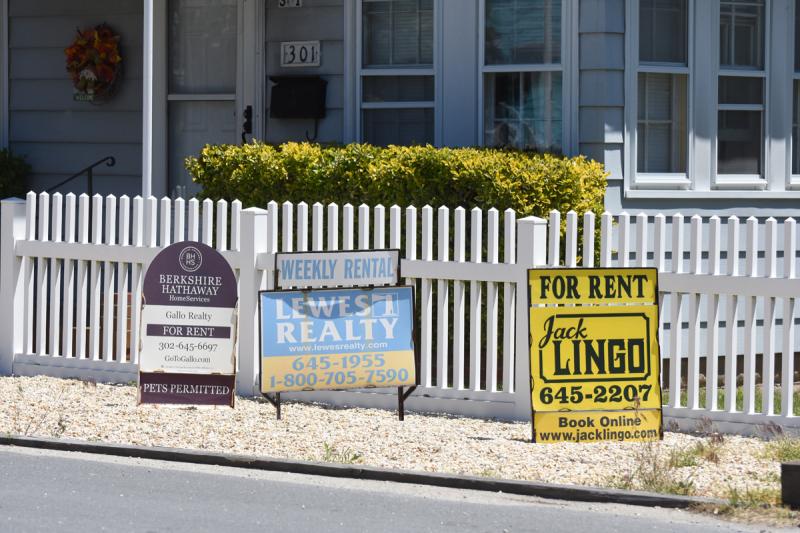Myrna and Tim Abbott, two retired teachers, have been renting out a three-bedroom house they own on Fenwick Island in recent years.
The Georgetown couple was among the people who voiced their opinions during a Dec. 10 public hearing about a proposed 3% tax on short-term rentals in unincorporated areas of Sussex County. Later in the meeting, Sussex County Council voted to defeat the tax.
Myrna Abbott said the couple’s 1,200-square-foot rental house is near the Delaware/Maryland line, and a selling point has been that their guests would not have to pay a local tax while rental units in Maryland are charged such a tax.
“One big advantage we had over Maryland is the selling point that there is no added tax,” she said. “We rent to single families and try to keep our rates relatively low in an effort to make it possible for middle-income families to receive the vacations they’ve worked so hard for without causing a strain on their vacation budgets.”
Abbott noted vacationers already benefit the community financially in other ways.
“Individuals who come for vacation will spend more per day in the shops and recreational facilities than year-round residents,” she said. “They do not put an added burden on our schools and other community services as [do] those in all the developments.”
Some people return every year to stay in their rental home, Abbott said.
John Yost, who said he has been renting out a three-bedroom beach house near his own home on Broadkill Beach for 15 years, also called for consideration of families.
“They scrimp and save to make this a great vacation week,” said Yost, who noted he has 10 families who rent his home at various times.
The only opposition offered from the audience was from Joe Sterner, who operates a bed and breakfast in Rehoboth Beach. Sterner said it is unfair that he is required to pay a tax while nearby large rental houses are not assessed the tax. Bed and breakfasts, hotels and motels already pay a 3% county tax.
Gov. John Carney signed into law legislation that authorizes counties to enact a tax on short-term rentals. Use of the revenue would be limited to workforce and affordable housing programs, beach nourishment, dredging, economic development, tourism programs, recreational activities, and water quality and flood control projects.
The state already has its own 4.5% tax on short-term rentals.
According to a statement by the Sussex County Association of Realtors opposing the 3% tax, more than half of short-term rentals are in unincorporated areas of the county.
The county receives about $1 million per year from the tax. County Finance Director Gina Jennings said the county has received about $3.4 million so far from the units that are assessed the tax in incorporated areas.
“We understand that local governments are regulating short-term rentals to ensure safe accommodations for renters and to enforce property maintenance and zoning codes,” said Adriane Gallagher, president of SCAOR, in the letter to the county.
“We also realize that some state and local authorities have leveraged STRs as a source of revenue by imposing fees and taxes on STR stays,” Gallagher said. “However, we believe such regulations and fees significantly impact property owners’ ability to rent out their properties on a short-term basis and will be detrimental to our local service industry, thereby having a negative cumulative effect on Sussex County’s economy."
Council’s vote was tied 2-2 before Councilman John Rieley cast the deciding vote in opposition.
Reilly said the owners of the rental units already pay property taxes, and he did not want to set a precedent by going along with efforts by the state to shift expenses, such as beach nourishment and dredging, onto the counties. Joining him in voting against the proposal were Mark Schaeffer and Cynthia Green.
The Abbotts were relieved by the council’s decision.
Kevin Conlon came to the Cape Gazette with nearly 40 years of newspaper experience since graduating from St. Bonaventure University in New York with a bachelor's degree in mass communication. He reports on Sussex County government and other assignments as needed.
His career spans working as a reporter and editor at daily newspapers in upstate New York, including The Daily Gazette in Schenectady. He comes to the Cape Gazette from the Cortland Standard, where he was an editor for more than 25 years, and in recent years also contributed as a columnist and opinion page writer. He and his staff won regional and state writing awards.
Conlon was relocating to Lewes when he came across an advertisement for a reporter job at the Cape Gazette, and the decision to pursue it paid off. His new position gives him an opportunity to stay in a career that he loves, covering local news for an independently owned newspaper.
Conlon is the father of seven children and grandfather to two young boys. In his spare time, he trains for and competes in triathlons and other races. Now settling into the Cape Region, he is searching out hilly trails and roads with wide shoulders. He is a fan of St. Bonaventure sports, especially rugby and basketball, as well as following the Mets, Steelers and Celtics.

























































